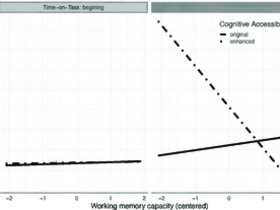
Impact of web accessibility on cognitive engagement in individuals without disabilities: Evidence from a psychophysiological study
DRANK
Web accessibility features on websites are designed for individuals with disabilities that include low vision and cognitive impairments, but such features can benefit everyone. This study investigates the impact of accessibility features of the web on ambient/focal visual attention and cognitive processing in individuals without disabilities. The study involved 20 participants reading news websites with different levels of low vision and cognitive-related accessibility features while their eye movements and heart rate variability were monitored. The findings show that cognitive engagement declined over time when no accessibility enhancements were present. The study also demonstrates that enhancing cognitive accessibility leads to increased user cognitive engagement, while low vision accessibility features make websites easier to read. These findings are corroborated by self-reports and psychophysiological measures, such as eye-tracking metrics and heart rate variability. The effects f…